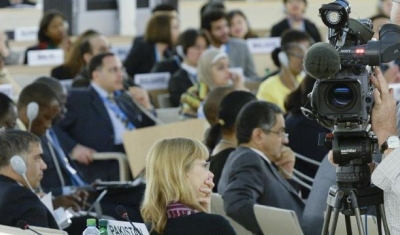Stakeholder Consultation: Geneva Guidelines on Less-Lethal Weapons and Related Equipment in Law Enforcement


Tony Webster
31 July 2018
Stakeholders are invited to submit comments or suggestions to a draft set of guidelines on the lawful and responsible design, production, procurement, testing, training, transfer, and use of less-lethal weapons and related equipment. These draft guidelines have been developed following a broad consultation process carried out in the framework of the Geneva Human Rights Platform and its focus on current challenges related to the use of force.
In an international expert group convened by the Geneva Academy and the Institute for International and Comparative Law in Africa (University of Pretoria) the United Nations (UN) Office of the High Commissioner for Human Rights, the International Committee of the Red Cross, the UN Office on Drugs and Crime, representatives from law enforcement agencies around the world, academic experts and members of civil society could comment on a draft set of guidelines on the lawful and responsible design, production, procurement, testing, training, transfer, and use of less-lethal weapons (LLWs) and related equipment.
About the Geneva Guidelines on LLWs and related Equipment in Law Enforcement
The draft revised by the international expert group was designed early this year by an academic working group made of leading academics, law enforcement experts and practitioners, and representatives from international organizations and civil society. The process also benefited from a series of meetings and consultations throughout 2018 and from ongoing contributions of several UN Special Rapporteurs.
This draft document aims to build upon, and in no way to challenge or to update, the United Nations (UN) Code of Conduct for Law Enforcement Officials and the UN Basic Principles on the Use of Force and Firearms by Law Enforcement Officials.
It is intended to assist relevant stakeholders in meeting the requirement of these existing standards to develop ‘non-lethal incapacitating weapons for use in appropriate situations’ and that such development and/or deployment of such weapons be ‘carefully evaluated in order to minimize the risk of endangering uninvolved persons’.
This process forms part of the Geneva Human Rights Platform and its focus on current challenges related to the use of force.
Inputs from a Broad Range of Stakeholders
The Geneva Academy and the Institute for International and Comparative Law in Africa (University of Pretoria) now seek further inputs from an even broader range of stakeholders, including representatives of states, law enforcement agencies, human rights bodies and mechanisms, private security companies, manufacturers, and individuals or agents of any bodies using force for law enforcement purposes, civil society organisations and human rights defenders.
Stakeholders are invited to submit comments or suggestions to thomas.probert[at]up.ac.za and kamelia.kemileva[at]geneva-academy.ch by 17 September 2018.









